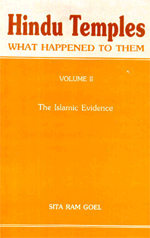|
 Page 1
Page 1
Monotheism had infected the Jews some two millenia before the birth of Muhammad. Moses had sold them into slavery to Jehovah, a demoniacal Spirit masquerading as the one and only God.1 Many books of the Bible tell the blood-curdling story of what the Jews did to themselves and to the others when goaded by this Gangster. The end result was their own ruination, and their dispersal as slaves and refugees in all directions. Meanwhile, the disease had spread to West Asia, Europe and North Africa in the form of Christianity. It had destroyed the Greco-Roman civilization as well as Germanic paganism, and spread darkness wherever it went. Now it was getting ready to engulf Arabia which had survived so far as an island of sanity in the midst of a surging sea of madness.
The pagan Arabs, however, had remained unaware of the menace advancing on them from all sides. Abyssinia, their neighbour to the west, had been a Christian stronghold for long, and had even launched a crusade against them in recent times. The Byzantine Empire, their neighbour to the north, had gone Christian early in the fourth century, and was busy rooting out paganism within its own precincts. The Sassanian Empire of Persia, their neighbour to the east, was patronizing a Zoroastrianism which had lost its ancient Aryan genius and imbibed the spirit of Judaism and Christianity. It had become a monotheistic creed complete with the Prophet, the Book, the Last Day, and Heaven and Hell. The only point it missed and, therefore, lost the race to Judaism and Christianity, was missionary zeal; it was not yet out to force other people to its own way of worship.
Each of these neighbours was aspiring to invade and dominate Arabia. What kept them in check was their mutual rivalry. The peace which Arabia had enjoyed for long intervals was a byproduct of this balance of power. Even so, several Arab tribes in North and South Arabia had embraced Judaism or Christianity. Worse still, both Jews and Christians had settlements in the very heart of Arabia. The role which these preachy communities played in the rise of Islam has been highlighted by Muslims scholars themselves. Shaikh Inayatullah writes:
Author : Shri Sita Ram Goel
Foot Notes
1 This view of Jehovah was expressed by Marcion of the school of St. Paul, early in the second century AD. The Old Testament he rejected in toto since it seemed to him, as it has seemed to many Christians since, to be talking of quite a different God: monstrous, evil-creating, bloody, the patron of ruffians like David (A History of Christianity by Paul Johnson, Penguin Books, 1978, p. 46). This was also the view of the Gnostics, an early Christian sect. The God of the Bible and the Qur�n was seen in this light by Thomas Jafferson, Thomas Paine, and Swami Dayananda as well.
|